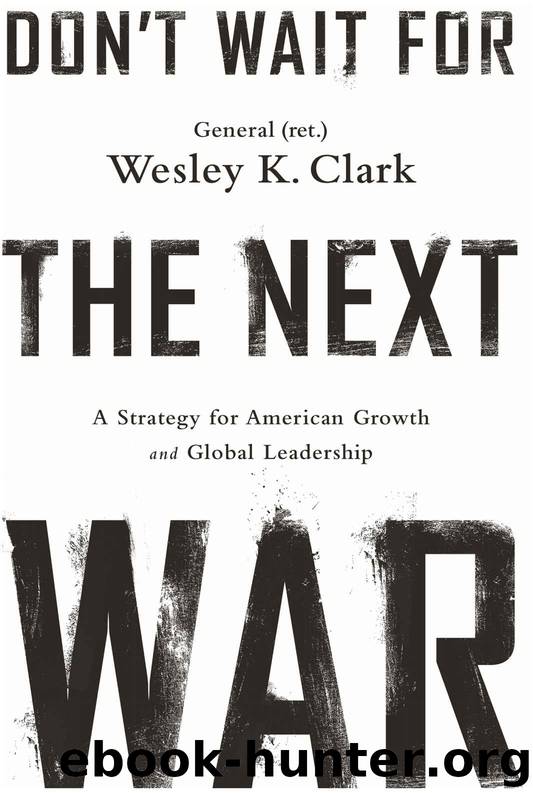Don't Wait for the Next War: A Strategy for American Growth and Global Leadership by Wesley K. Clark

Author:Wesley K. Clark [Clark, Wesley K.]
Format: epub
Tags: Itzy, Kickass.so
ISBN: 9781610394345
Publisher: PublicAffairs
The Failure of Public Dialogue
The current limitations on federal resources result in part from the fractious political landscape in the United States in the past few years. The stark partisan divisions undercut the focus on long-term trends that matter to the economy and beyond. And the continuing debate over limited government resources seems to be the bread and butter of political differentiation.
Partisan competition has very deep roots in America. This was recognized during the writing of the US Constitution. It was the Founding Fathers’ genius to acknowledge that such competition was inevitable, and to deal with it through the separation of powers between the various branches of government and through a system of checks and balances. James Madison and Alexander Hamilton addressed the problem of “factions” in Federalist Paper no. 51, writing, “Let interest counteract interest, and ambition counteract ambition.” This was the genius of the American Constitution—that it provided the mechanism to bring such competition into the structured machinery of government in a way that allowed issues to be addressed and resolved. And in general, it has worked, except for the question of slavery.
But the current tone of partisan competition seems particularly vehement. In fact, some of the most heated arguments stem from a long-running debate about the public interest versus economic freedom that dates back more than one hundred years—to the beginning of the twentieth century, when the Progressive movement emerged in response to the extreme concentration of corporate wealth that was then taking place and the accumulation and abuse of political power locally and nationally. Then a national outcry curbed the powers of corporations in a series of constitutional amendments, sweeping laws, and structural changes in American society and the economy, providing the basis for America’s twentieth-century power.9
During the twentieth century, academics added their authority to the debate. In the 1930s and 1940s, the work of British economist John Maynard Keynes provided a foundation for a larger government role in the economy. In his 1936 book, The General Theory of Employment, Interest and Money, Keynes formulated the idea of “aggregate demand”—the sum requirement for goods and services within an economy and its impact on national income—to explain why cutting government expenditures in times of economic contractions would be harmful, producing results exactly the opposite of those intended.
Keynes’ prescription rested on the idea that the operation of supply and demand in free markets, even with clear-thinking participants and perfect information, might not stabilize an economy at full employment. Even though individuals and families should live within their means, government deficits weren’t always bad, he said, and government surpluses, or even balanced budgets, weren’t always good. More fundamentally, governments should always be able to intervene and tinker with the operation of an economy with some degree of legitimacy, seeking not only to prevent banking failures and securities fraud, but also to regulate the rate of inflation and to promote full employment. Keynesian economics became economic orthodoxy.10
The challenge to the Keynesians came primarily from the “monetarists,” led by University of Chicago economist Milton Friedman, and therefore often called the “Chicago school” of economics.
Download
This site does not store any files on its server. We only index and link to content provided by other sites. Please contact the content providers to delete copyright contents if any and email us, we'll remove relevant links or contents immediately.
| Arms Control | Diplomacy |
| Security | Trades & Tariffs |
| Treaties | African |
| Asian | Australian & Oceanian |
| Canadian | Caribbean & Latin American |
| European | Middle Eastern |
| Russian & Former Soviet Union |
The Secret History by Donna Tartt(18998)
The Social Justice Warrior Handbook by Lisa De Pasquale(12177)
Thirteen Reasons Why by Jay Asher(8873)
This Is How You Lose Her by Junot Diaz(6856)
Weapons of Math Destruction by Cathy O'Neil(6248)
Zero to One by Peter Thiel(5765)
Beartown by Fredrik Backman(5710)
The Myth of the Strong Leader by Archie Brown(5481)
The Fire Next Time by James Baldwin(5409)
How Democracies Die by Steven Levitsky & Daniel Ziblatt(5200)
Promise Me, Dad by Joe Biden(5128)
Stone's Rules by Roger Stone(5065)
A Higher Loyalty: Truth, Lies, and Leadership by James Comey(4937)
100 Deadly Skills by Clint Emerson(4899)
Rise and Kill First by Ronen Bergman(4758)
Secrecy World by Jake Bernstein(4727)
The David Icke Guide to the Global Conspiracy (and how to end it) by David Icke(4684)
The Farm by Tom Rob Smith(4486)
The Doomsday Machine by Daniel Ellsberg(4473)
